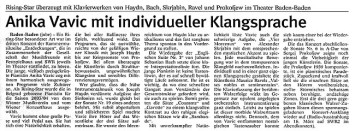Press
03. 02. 2004
Anika Vavic with individualistic musical idiom
Rising Star was convincing with piano works by Haydn, Bach, Scriabin, Ravel and Prokofjew in the Baden-Baden Theater
A special kind of Rising Star was to be heard in the third concert of the series "Discoveries" co-sponsored by the Musikverein Society, the Festival Theater and the Southwest Broadcasting System (SWR) which takes place in the Festival Theater. The young, prize-winning pianist Anika Vavic attracted a large audience with her harmoniously calibrated program. The pianist, born in Belgrade, was the Viennese Musikverein and Konzerthaus choice for the season 2003/04. Vavic performs with neither pose nor with abundant pedal. In spite of the refinement of her playing style she has conserved a pleasant naturalness. The program she selected ranged from the pleasing Viennese classic of Joseph Haydn to Prokofjew's War Sonata. By virtue of her consciousness of structure, her unusual sense for sound and her sensitive ability to differentiate, the artist was convincing in each of the pieces.Whoever thought that Joseph Haydn's early instrumental music was merely a diluted version of his symphonies was immediately taught a lesson with Sonata Nr. 19. Vavic drew the audience's attention to the substance of the three movements. She was able to articulate clearly the wealth of Haydn's ideas and place the almost singable theme in the foreground.The performance of the English Suite No. 3 by Johann Sebastian Bach marked the continuation of her interpretative style. The young pianist is no keyboard lioness interested only in rattling off rapid runs. For her it is important to be able to play a higher pace when it is vital for understanding the overall structure. Therefore the movements "Courante" and "Gavotte" provided a sonorous contrast to the more peaceful, elegiac movements such as "Sarabande".With relaxed naturalness Vavic accomplished the difficult task of playing Alexander Scriabin's Four Pieces with the appropriate mystical accent. Thanks to the transparent sound each and every musical motion could be followed. The artist performed Maurice Ravel's Valses nobles et sentimantales in an individualistic, completely personal musical idiom. The piano version of the waltzes seems simple in comparison with the opulence of the orchestral instrumentation. But easy to play this morbid dream waltz is not. Nevertheless hardly anyone was able to escape the nostalgic keyboard magic which Vavic kindled.Prokofjew's Sonata No. 6 in A-Dur, which rounded off the program, demonstrated once again the young artist's versatility. The Sonata, which Prokofjew composed in 1939, is a showpiece for piano. Gripping and strong the individual movements passed in review, stormy moments were placed carefully next to calm, devout zones. Only the three encores which Vavic gladly performed were able to liberate the concert from its high-voltage conclusion (radio broadcast on 16 March in the SWR 2 Evening Concert).
[ original article ]
